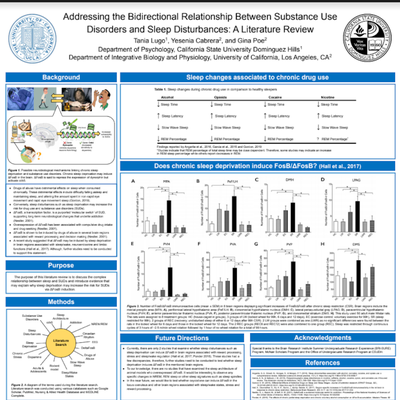
Tania. S. Lugo
Home Institution: CSU Dominguez Hills
UCLA Mentor: Dr. Gina Poe
Program: BRI-SURE
Abstract:
Drugs of abuse such as opioids have detrimental effects on sleep when consumed chronically. These detrimental effects include difficulty falling asleep and maintaining sleep, and altering the amount spent in non-rapid eye movement and rapid eye movement sleep. Conversely, sleep disturbances such as insomnia and sleep deprivation may increase the risk for drug use and substance use disorders (SUDs). ΔFosB, a transcription factor, is a purported ‘molecular switch’ of SUD, supporting long-term neurobiological changes that underlie addiction. ΔFosB is shown to be induced by drugs of abuse in several brain regions associated with reward processing and decision making, including the nucleus accumbens, ventral tegmental area and the prefrontal cortex in response to chronic drug use. Recent studies also suggest that ΔFosB may be induced by sleep deprivation in brain regions associated with reward-processing, autonomic, neuroendocrine and limbic functions. Although there is evidence of a bidirectional relationship, the exact neurobiological mechanisms linking sleep and substance use disorders are yet to be understood. Therefore, the purpose of this literature review is to discuss the complex relationship between sleep and SUDs and introduce evidence that may explain why sleep deprivation may increase the risk for SUDs via ΔFosB induction. Understanding the complex relationship between sleep disturbances and addiction may better inform treatments for SUDs.

